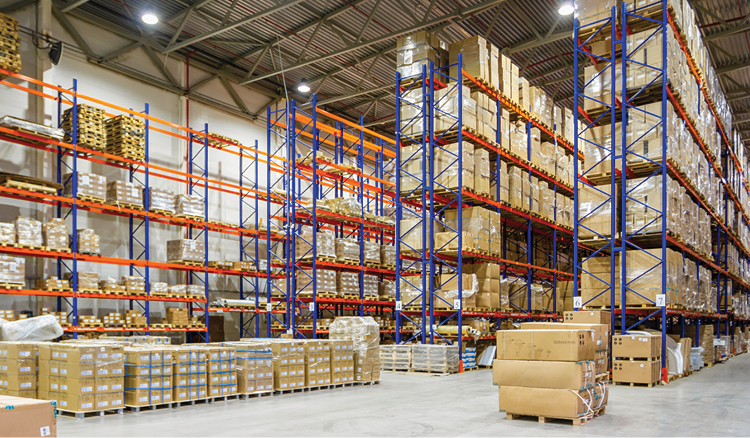A New Normal for Houston Manufacturers & Distributors: Thriving Under Trump 2.0
Houston’s Industries are Under Pressure — What are you going to do about it?
Houston has always lived with volatility. Oil booms built our skylines, busts left them hollow. NASA contracts brought glory, then disappeared with budget cycles. Freight yards filled one season, then sat idle the next. None of that is new. What is new is the number of pressure points converging at the same time. Tariffs are being rewritten, forcing importers to redesign supply chains. Soft oil prices are stalling upstream projects, starving equipment suppliers of steady work. NASA’s funding is caught in political crossfire, leaving aerospace contractors hanging between order releases. Workforce enforcement is reshaping the labor force in industries that once depended on avoiding scrutiny.
This isn't about politics. Changes were overdue and necessary for a myriad of reasons. However, for Houston, they are direct and immediate hits on our factories, warehouses, and machine shops. Fabricators are stuck with half-completed orders and idle crews. Distributors are paying detention fees because shipments arrive in unpredictable waves. Inspectors are buried in paperwork while shops slip behind schedule. Food and light manufacturers are scrambling to replace entire teams after compliance sweeps. The disruption is here now.
The companies still staffing for “average demand” will not survive. Average no longer exists. Demand spikes, crashes, and shifts overnight. Supply chains bend and break under political decisions as much as market forces. The next crude price swing or NASA budget cycle will not restore balance. Volatility is not the exception. It is the environment.
The Numbers in 2025
- Port Houston moved 392,829 TEUs in July 2025, a 21% increase over July 2024, bringing the year-to-date total to 2.56 million TEUs, the fastest growth in its history.
- The U.S. rig count is 538 as of late August 2025, down 8% year-over-year, with Texas upstream firms cutting nearly 3,000 jobs in June and July as crude holds near $63 a barrel.
- The proposed FY26 budget slashes NASA funding by 24%, from $24.8 billion to $18.8 billion, which would be the lowest since 2015.
- ICE conducted more than 2,400 workplace audits in 2025, with warehousing and food production being the hardest hit sectors.
What Does This Mean for Houston?
The facts speak for themselves. Freight volumes are at record highs, yet compliance bottlenecks choke the flow. Oilfield suppliers are losing jobs as projects stall. Aerospace firms are staring at the sharpest budget cut in a decade. Employers across light industry are rebuilding entire labor pools overnight. These are not isolated issues. Together, they form a single stress test on Houston’s entire industrial base.
The leaders who succeed will be those who face this reality directly, strip away the comfort of averages, and design operations that bend without breaking. Resilience comes not from hoping for calmer seas, but from building systems that can flex when the waves hit hardest.
What follows is a breakdown of the four pressure points squeezing Houston—tariffs, oil and gas drag, aerospace budget whiplash, and workforce enforcement—and, more importantly, the specific actions companies in each sector can take to turn disruption into advantage.
Four Pressure Points
1. Tariffs and Trade Rules
The landscape of trade is no longer built on consistency. In 2025, duties are not a ceiling — they are the new baseline. Companies that were designed for smooth import flows are now fighting through customs bottlenecks, rework cycles, and duty paperwork. The pressure is operational, not just financial.
What Has Changed
- The U.S. imposed a 10 percent baseline tariff on imports from nearly all countries this spring, with country-specific tariffs layered on top.
- By August 29, the long-standing de-minimis exemption for shipments under $800 was eliminated for all countries, pushing millions of parcels per day into customs inspection.
The Impact in Numbers
- In fiscal 2024, 1.36 billion de minimis shipments worth $64.6 billion entered the U.S. — about 4 million parcels per day. Overnight, every one of those shipments now requires paperwork, inspection, and duty collection.
- Port Houston is already moving record volume in 2025, up 21 percent year-over-year. More freight means more stress, and the margin for error is disappearing.
The Problems Operations Face
- Compliance backlogs. Every shipment that used to sail through now requires labels, documentation, and handling steps your team was never staffed to perform.
- Rework bottlenecks. Parcels kicked out of flow for relabeling or inspection tie up dock space and delay outbound throughput.
- Labor mismatch. Your full-time dock team can unload trailers, but cannot absorb the surge of duty paperwork and re-pack work without burning out.
- Cost volatility. Landed costs swing week to week, yet you still need crews ready to process freight in real time.
Where Veryable Fits
This is exactly where on-demand labor creates breathing room:
- Customs Surge Crews. Deploy operators to handle relabeling, repack, and duty-driven rework the day it arrives, instead of stacking freight in corners waiting for staff capacity.
- Cycle Count and Compliance Pods. Build flexible teams trained on counting, labeling, and data entry to meet customs requirements without pulling your core team off critical flow.
- Dock-to-Stock Support. Use daily operators to clear containers Thursday and Friday when flows peak, avoiding detention fees while keeping your warehouse team focused on the mainline.
- Flex Down as Fast as You Flex Up. When shipments level out, you release the operators. No stranded headcount. No overtime burn.
Outcome
By shifting tariff-driven tasks onto an on-demand bench, companies protect their baseline workforce, absorb customs volatility without slowing throughput, and cut detention costs. What once felt like a compliance nightmare becomes another variable you can manage with precision.
2. Oil & Gas Drag
The energy sector is slowing, and with it the ripple effects are hitting every supplier in Houston. Crude prices are holding near the mid-sixties, keeping exploration and upstream investment on pause. The U.S. rig count sits at 538, down 8 percent from last year. Texas upstream firms have already cut close to 3,000 jobs in June and July alone. When projects stall, orders for equipment, machining, and field services dry up. When projects restart, they return in a flood that collapses shops under backlogs they cannot clear.
The Problems Operations Face
- Start and stop cycles. Shops swing between idle weeks and sudden surges of purchase orders. Skilled machinists and welders are underutilized one month and buried in backlog the next.
- Idle workforce costs. Crews wait during downturns, but the fixed cost of payroll cannot be carried indefinitely.
- Overtime burn. When projects unfreeze, overtime hours multiply, eroding margins and wearing down your core team.
- Turnaround strain. Planned outages still require bolt-up, blind lists, cleaning, and material handling, but certified craft cannot be pulled from critical tasks.
Where Veryable Fits
Veryable solves the volatility problem by letting suppliers keep craft labor on the highest-value work and filling the rest with flexible operators:
- Backlog Pods. On-demand operators handle prep, deburr, staging, hydro-test setup, and traveler packets. Certified machinists and welders stay on their tools, not stuck in support work.
- Turnaround Support. Surge crews handle bolt-up, blind lists, line cleaning, and material moves so your skilled teams can stay focused on precision work.
- Overtime Control. Run lean during slow periods, then add operators within 12 to 24 hours when projects release. Protect your team from burnout and protect margins from runaway overtime.
- Shop Floor Agility. Scale throughput in days instead of weeks by layering on-demand operators when needed, then releasing them as volume drops.
Outcome
By integrating an on-demand bench, suppliers can protect delivery promises, keep skilled labor focused, and cut idle costs. When projects surge, they respond with precision instead of panic. When projects pause, they do not bleed payroll waiting for the next order.
3. Aerospace and Precision Machining
NASA and defense suppliers around Houston are living inside budget uncertainty. The proposed FY26 budget would cut NASA funding by 24 percent, dropping the agency from $24.8 billion to $18.8 billion, the lowest since 2015. That single decision has rippled through every contractor tied to Johnson Space Center. Orders slow, scopes change, and suppliers hold capacity for work that may evaporate overnight.
At the same time, precision machining and aerospace production cannot afford to stand idle. When a release does come, every hour matters. Falling behind in cycle time means penalties, missed milestones, and damaged relationships with prime contractors.
The Problems Operations Face
- Idle capacity. Shops cannot keep full crews on payroll when orders freeze, yet they cannot hire back fast enough when they restart.
- Paperwork bottlenecks. Inspectors and certified staff are buried in packet collation, stamps, and documentation that consume time better spent on quality-critical tasks.
- Rework drag. Material Review Board overflow and nonconformance rework pile up, delaying mainline production.
- Project lumpiness. Contracts release in bursts of two to three weeks, but fixed headcount cannot flex fast enough to cover short-cycle demand.
Where Veryable Fits
Veryable gives aerospace and machining suppliers the ability to treat variability as manageable, not fatal:
- Documentation Pods. Operators can take on collation, labeling, stamping, and photo records so inspectors focus only on certified work.
- Rework Teams. Deploy operators trained on MRB support and corrective action tasks. This prevents rework from bleeding into mainline production.
- Final Assembly Assist. On-demand operators handle fastening, torque witnessing, and reset tasks under supervision, freeing certified techs to stay on high-skill steps.
- Project Smoothing. Build a bench of operators who can be slotted into short two to three week cycles, giving you surge capacity without long-term commitments.
Outcome
By using an on-demand bench, aerospace and machining suppliers can keep throughput steady despite funding whiplash. Certified staff remain focused on the work only they can do. Paperwork and rework get cleared faster. Short-cycle contracts get delivered without inflating permanent headcount. The result is resilience in the face of uncertainty and credibility with customers who expect precision regardless of politics.
4. Workforce Enforcement
In 2025, the enforcement climate is shifting faster than many businesses can adapt. ICE conducted more than 2,400 workplace audits this year, the highest level in over a decade. Warehousing, food processing, and light manufacturing have been the hardest hit. For companies that had quietly depended on undocumented labor, entire crews are disappearing overnight. For those trying to stay compliant, the risk and administrative burden have grown heavier, and competition for skilled entry level workers has increased.
The Problems Operations Face
- Sudden labor loss. Audits or raids can wipe out an entire entry-level crew with no warning.
- Compliance cost. I-9 checks, E-Verify requirements, and documentation create hours of administrative work for HR teams that are already stretched.
- Training drain. When crews are turned over, supervisors must retrain replacements again and again, dragging productivity down.
- Reliability risk. Even when crews remain, the constant uncertainty erodes trust in staffing and makes planning nearly impossible.
Where Veryable Fits
Veryable helps companies stay compliant while keeping operations stable:
- Pre-vetted Operator Pool. Every operator is screened and documented, reducing compliance risk while giving companies confidence that crews can be deployed immediately.
- Rapid Replacement. If an audit wipes out part of a crew, ops can be posted and accepted in hours, preventing production gaps.
- Task-Specific Deployment. Instead of relying on generic headcount, companies can post work for exact needs, staging, pallet moves, cleaning, line support, and fill them only when required.
- Scalable Bench. Build a bench of trusted operators who can be re-engaged quickly, cutting retraining costs and stabilizing throughput.
Outcome
By using Veryable to build a compliant and flexible labor pool, companies replace risk with resilience. Entry-level tasks still get done, but without exposing the operation to enforcement shocks or the cost of idle headcount. When the labor climate changes overnight, leaders who have built this bench are the ones who keep production moving.
The Bottom Line
Houston is under pressure. Tariffs have turned distribution into a compliance race. Oil and gas cycles are leaving suppliers whiplashed between idle crews and crushing backlogs. Aerospace firms are stuck between shifting scopes and bursts of short-cycle projects. Workforce enforcement is rewriting the rules for entry-level labor.
Each of these challenges carries its own weight, but together they form a single reality: volatility is permanent. Average demand does not exist anymore. The companies that will lose are those hoping for a return to stability. The companies that will win are those that prepare to flex both up and down with precision.
The questions every leader should ask right now are simple:
- Do I have a bench I can activate within hours?
- Have I documented the tasks my core team should never be pulled away from?
- Can I flex down as easily as I flex up?
Veryable is not a temp agency. It is a precision tool for building resilience. Operators can be deployed in hours, scaled for days or weeks, and released without cost when not needed. This lets leaders protect their core teams, cut overtime, reduce idle time, and keep flow moving even when the environment shifts overnight.
Houston’s future will not be defined by who avoids volatility, but by who masters it. The pressure is here. The only question is: what are you going to do about it?
To take the first step, create your free business profile or contact me.
Previous Posts
From Activity to Outcomes: A New Standard for Publicly Funded Manufacturing and Workforce Programs
The Future of Manufacturing and Logistics
Create a free business profile today to explore our platform.






